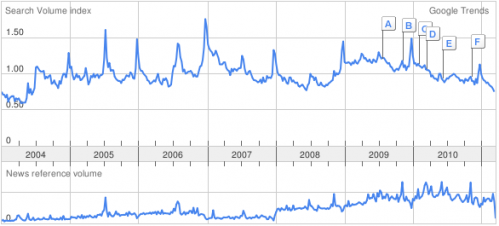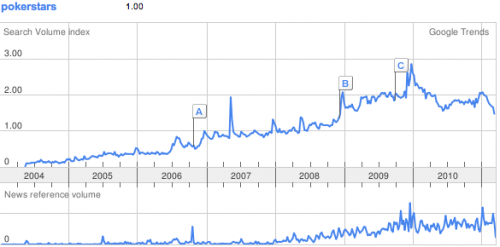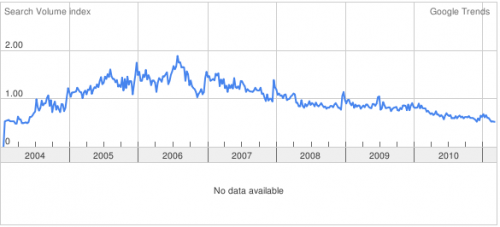I have to admit that I’m no expert using Google Trends (yet) but I was just checking out some stats on the site and there are some trends that seem to reflect what people are whispering in the background of the industry.
Here is the trend that is developing in the search for the word “poker” on Google.
Over at PokerScout they keep reporting year over year numbers are falling. This echos what many people are talking about outside of the public ear. You have two trends converging which is a petering out of the online poker market in general (as evidenced by search traffic above) and consolidation.
Remember, December was a huge month for online poker both seasonally and because Senator Harry Reid had a bill in front of Congress to legalize online poker in the US. Yet Google Trends shows that overall search traffic was barely above the levels of the previous year’s low point.
Look at searches for “pokerstars”
Their high season in Dec was lower than the year prior and they’ve dropped off just as rapidly in the first part of the year as they have in every other year. Not since 2008 have they started out a new year with search queries this low.
I guess you can make the argument that as a poker room becomes more popular people search for it less but if you go back to the Google Trends graph for “poker” as a whole it seems that the trend is on a decline. It’s not brand specific. Even a generic term like “poker” is trending down.
Even for terms like “poker bonus” the trend is heading down.
The poker bubble has burst. Right now everyone is scrambling not to be the latest carnage being reported in the press. Players are migrating from the smaller, and less liquid, poker sites to the most popular online poker rooms. This is why if you only follow PokerStars or FullTilt numbers it looks like everything is fine and dandy.
But in reality, there are no new markets to crack. There is no untapped source of US players. Despite all of the press releases that report some company or another is entering the Asian market (despite the fact there’s no such thing as “the Asian market”) in a big way, nobody is showing any major success in the region. Everyone is fighting tooth and nail over what’s left.



May u allow me tu translate some parts for my french blog?
Very interisting post.
Looks like standard evolution.
Well, that’s sort of what cracks me up when you read a press release from the latest gaming site claiming that they have established a relationship with a partner in the area. The partner might be either the mafia or a second tier agent who will then attempt to milk as much money out of you as possible.
Oh, the stories I’ve been told included just about every single mob cliché there is, so I rather not. There are suppliers getting (or at least trying to get) into those Super-Agent loops though which essentially means money on credit is injected into various online gaming hubs. Being the head of fraud in such companies is not something I want to do either.
@Kim: I think you already know the answer to your question As a huge generalization Asians seem to like to gamble on luck based games. For instance in the popular game of Bpauk Bpet Bpauk Gao which is a variation on Baccarat in Thailand I’ve tried to figure out and explain the odds to friends who play it but they would much rather rely on a lucky hunch, their horoscope, or the fact that they just went to make merit at the temple than the pure math of their odds of hitting a winning card.
As a huge generalization Asians seem to like to gamble on luck based games. For instance in the popular game of Bpauk Bpet Bpauk Gao which is a variation on Baccarat in Thailand I’ve tried to figure out and explain the odds to friends who play it but they would much rather rely on a lucky hunch, their horoscope, or the fact that they just went to make merit at the temple than the pure math of their odds of hitting a winning card.
The other part of it is that in many Asian markets where illegal gambling is well rooted they have an “Agent” system. You have one super-agent who has a budget of how much credit he loans out to sub-agents and those sub-agents have sub-sub-agents, etc, etc. A lot of wagering in Asia is done on credit and it’s linked into this agent system. At the lowest level you have people offering credit for what we would consider trivial amounts (a few dollars). But in Asia it’s like an affiliate system with extra obligations for the affiliate.
As an agent you give your players the money to play with. You only give credit to those who you think you can collect from. If they loose and they don’t pay it back then you’re on the hook to the agent above you and him to the agent above him, etc, etc.
So it really requires a very intimate relationship with the market. If you want to bust into Asia you have to figure out who the super-agents are and convince them you can put more money in their pocket than the next guy. Then you have to front him a certain amount of credit that he can filter down to his sub-agents.
Oh, and since the existing suppliers of illegal gambling are the mafia . . . go ahead and figure out how that’s going to work out for you.
Bill,
I apologize for not making it clear enough that I certainly don’t consider “Asians” a homogenous group.
I also “know” from detailed and entertaining reports what is required to do business in these markets with for example the Stanley Ho posse in Macau.
It’s infinitely tricky. And weird. Check.
The question I’m wondering about is rather if the mentality of people of any Asian origin (Chinese, Japanese, Indian, Indonesian, Thai) is such that the game of poker can really become a phenomenon.
My own very limited experience of discussing gambling with people of Thai heritage
for example is that the whole “skill” shtick doesn’t really do it for them. It’s like they don’t see the point of it if you’re supposed to rely on skill and not luck.
You could say I get the sense that the whole concept of “luck” is viewed in a different light than in the Western world. I for one find their view (if I got it right) very liberating.
Doesn’t mean there’s not a significant market there if you can manage to wade through all the shenanigans and are prepared to waive a moral code or two, but I’m just questioning whether the cultural conditions are in place for poker to ever become widespread and accepted the same way it has (to a degree anyway) in Western societies.
I guess Japan is a particularly tricky case in this regard.
@Markus: I think that’s the whole point. Other than Rush Poker and a few other exceptions, for a business that makes billions of dollars a year, there seems to be very little innovation.
The affiliates have a head-start in that area as they’ve always been more innovative than the rooms themselves but overall it’s still pretty weak.
@Mark: Good point. However, as you said, the term for poker has flattened out. The big growth isn’t there anymore.
@Ken: I look at it from the perspective of public company having to explain to investors why they keep reporting disappointing earnings quarter after quarter.
@Kim: There is no Asian market. There are many markets within Asia. To even try to see them as one market is the first mistake most companies are making. Each country has very distinct cultures which are often world’s apart.
Overall, there’s a huge potential for gambling but I don’t think poker will become huge in Asia without some sort of significant push. Most of the gambling in Asia is in the casinos, sports books, and on the lottery.
However, as nearly every company that has tried to crack the supposed Asian market has found out, things operate a little differently in this region of the world. The local mafia currently runs most of the illegal casino and sports book gambling in many countries. The chances that a European room is going to be able to come in and start running online sports books or a casino without cutting in the mafia or some high-up officials in many countries is unimaginable.
And I’ve seen a few companies announce supposed deals where they were going to partner with some local Asian company in order to offer online gaming but few if any have every amounted to anything. The partners either don’t have the connections they promised or they’re milking them for information so they can go it alone.
The poker boom is not over and it is never going to be over. People these says are addictive to poker there are people who bet half of there income on poker ans most of them loose . it sad but it’s true
Hmmm well I guess the only way for both affiliates and operators to keep earning from online poker is to concentrate on new innovations such as “Rush Poker” at Full Tilt… but checking the monthly search enquiries, these keywords don’t seem to be enough to sum up for a whole market.
EGR and MECN reported significant growth rates in the bingo sector and also for skill and casual games. Guess we affiliates need to be a little more creative in order to get our piece of cake. A friend of mine who is targeting the German market recently made shitloads of money with the keyword “wimmelspiele” lol …
Nice piece Bill,
One extra that I think could be factored in is the international diversification of poker. I tried a trends search for ‘ покер’ which is Poker in Cyrillic (Russia / Eastern Europe), seems to have boomed during the end of 08 and 09 then more or less flatled during 10 / 11. Guess this could be even more marked with the different variations of ‘bonuses’ for the recently busy German and Spanish / S. American markets.
http://www.google.com/trends?q=%D0%BF%D0%BE%D0%BA%D0%B5%D1%80
Anyway, great post!
Mark
When you compare those charts to a variety of business charts, poker doesn’t look bad at all. Certain market sectors would kill for your chart. The last two years have been difficult one for those have or lost jobs. Disposable income is another chart that would be happy with your stats.
Great bit of research Bill.
As someone who I presume have a better take on the “asian market” than most, what’s your general opinion? Disregarding all the legal obstacles, is there even a market underneath? The South Koreans obviously have a gaming tradition similar to what drove the mad growth in Scandinavia but what about the rest?
I mean, broad band penetration is not really an issue if I remember some old stats I saw once (and we’re going mobile regardless). And neither is the lack of middle-class Asians. But is the right gaming culture/tradition in place for poker to ever catch on properly in say India, Thailand and Indonesia?
Having worked in a brick-and-mortar casino I know first hand the love and special connection to gambling that many Asians have. But I’m not 100% convinced it converts into a passion for poker that well.